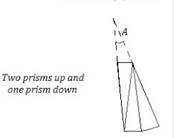A prism can produce a minimum deviation δ in a light beam. If three such prisms are combined, the minimum deviation that can be produced in this beam is
In combination (refractive angles of prisms reversed with respect to each other), the deviations through two prisms cancel out each other and the net deviation is due to the third prism only. So, option (B) is correct.

A. Deviation produced by a combination of prism can never be 0. So, option (A) is incorrect.
In option (C) and (D) are incorrect because minimum deviations are asked.
1